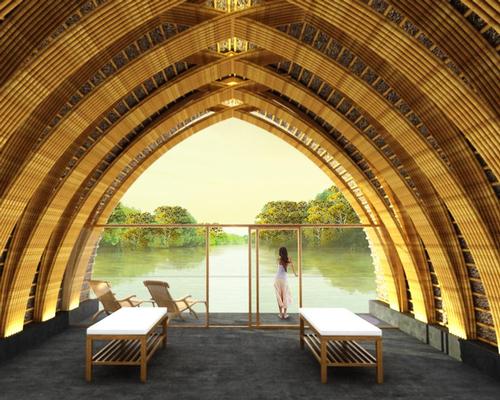08 Aug 2016
Vo Trong Nghia designs floating bamboo spa on Vietnamese island
BY Kim Megson

The architectural studio of Vo Trong Nghia are creating a floating bamboo spa on the Vietnamese island Phu Quoc.
Named the Signature Spa, the facility will be attached to a five star hotel on the island, which is famous in the region for its dense expanses of nature and areas of jungle.
The spa will consist of a building containing treatment rooms, alongside a series of arched bamboo podiums that will provide space for relaxation and consultation services. Each arch will hover above the water of a small lake surrounded by mangrove trees, with glass walls providing a view across the water.
Guests will travel between the buildings on a stone walkway that emerges just above the water level.
The combination of stone, glass and bamboo is designed to evoke “a reserved simplicity” and to reconnect visitors with nature.
Each bamboo podium will resemble hands clasped together and fingers interwoven. Where the frames meet, a skylight opening will be included to diffuse changing light into the space.
“The design aims to establish a compact and autonomous place of solace, wherein one can immerse themselves within the lush mangrove reservoir whilst nestled inside the bamboo constructs,” said the studio in a statement.
The Signature Spa will have four single treatment rooms and one double treatment rooms. There will also be separate rooms for foot treatments and pedicures.
The project was designed by Nghia and studio partner Hidetoshi Sawa. The client is the Syrena Viet Nam Investment & Development company. A completion date for the project has not yet been released.
Speaking in the new issue of CLADmag, which is out now, Vo Trong Nghia said good design is about “how to make humans much more connected to nature.”
“In the very near future we have to become more green – using things like green walls and roofs and environmental materials,” he said. “Otherwise, we will all die very soon because of climate change, conflict and misuse of technology.
“With all our projects we look at the surrounding nature and see how we can harmonise with that. [Leisure buildings] don’t have to be concrete, especially in tropical climates.”
Close Window